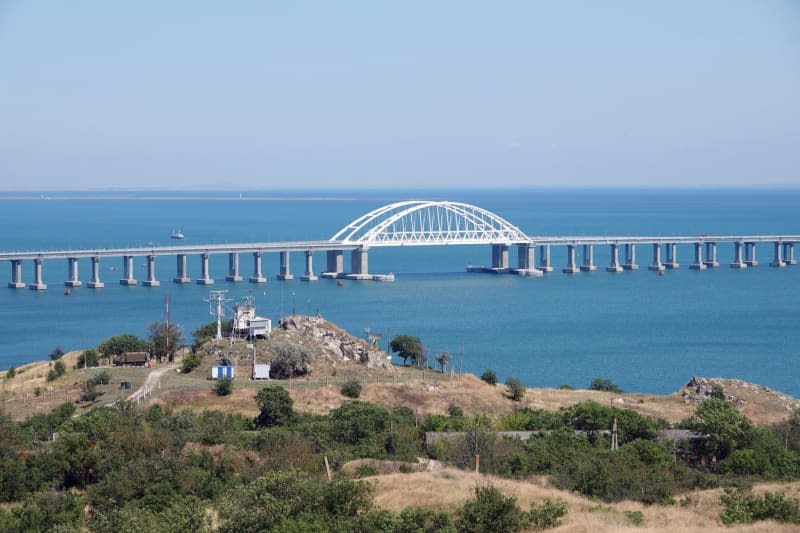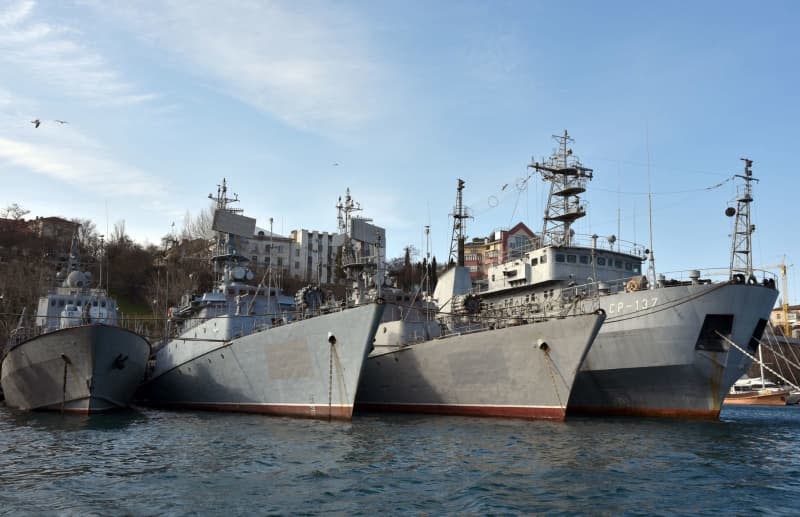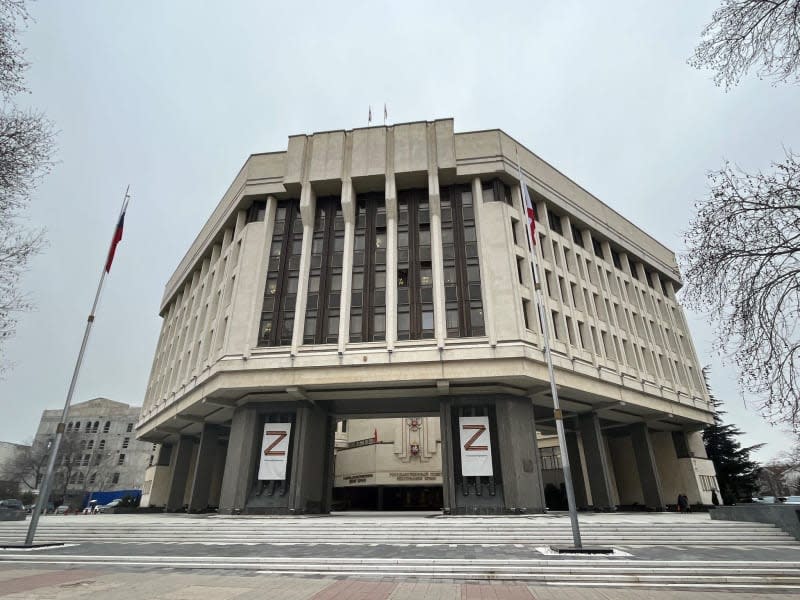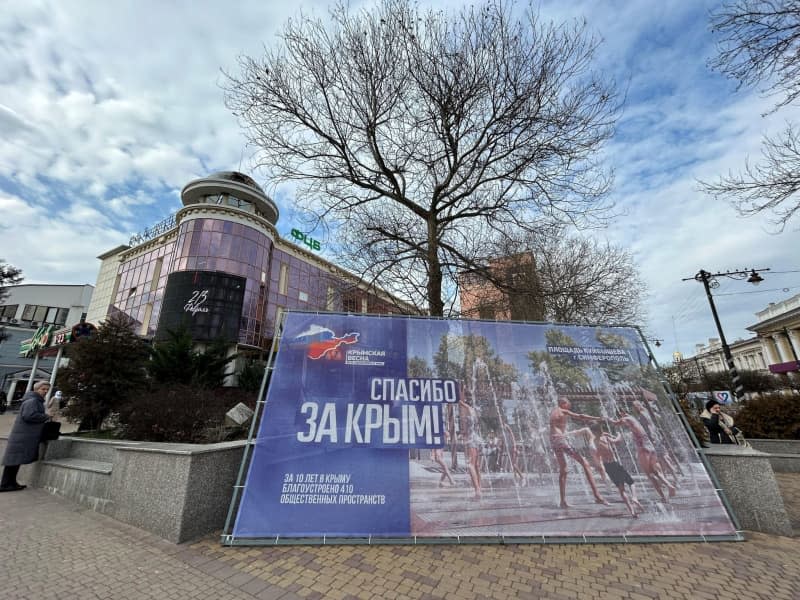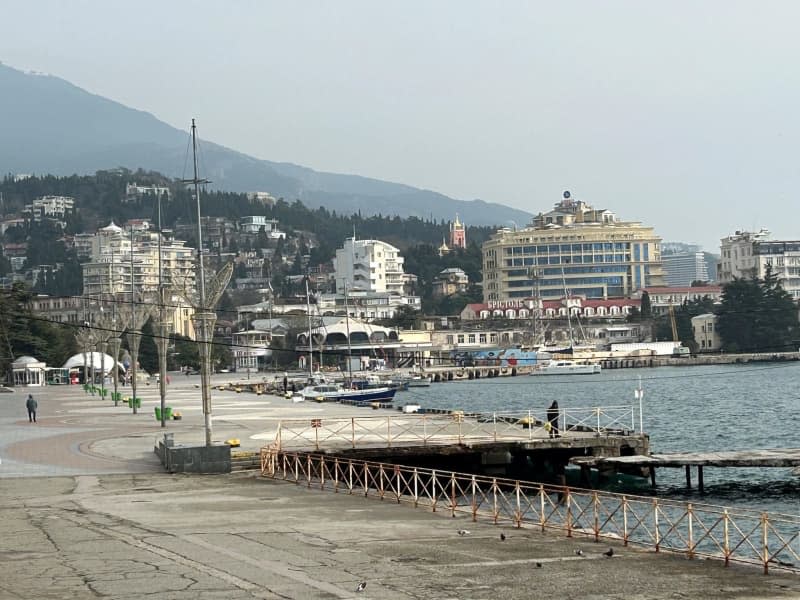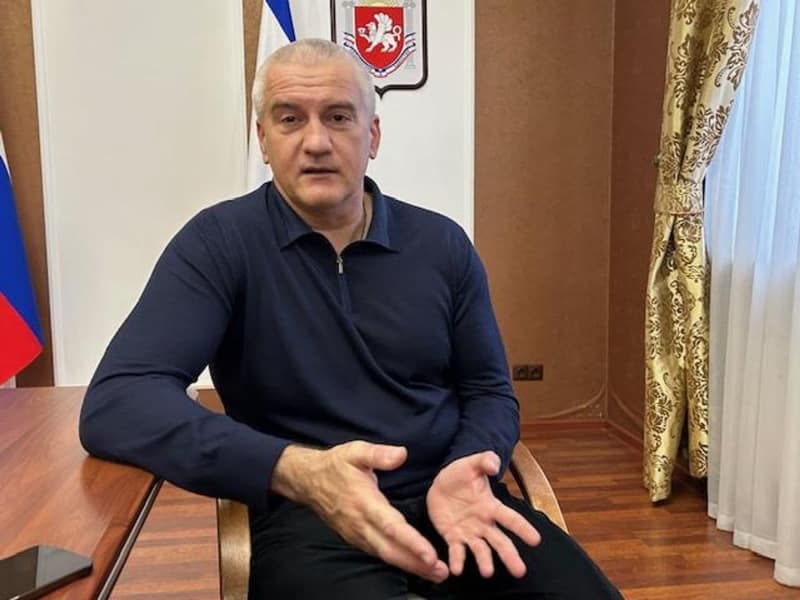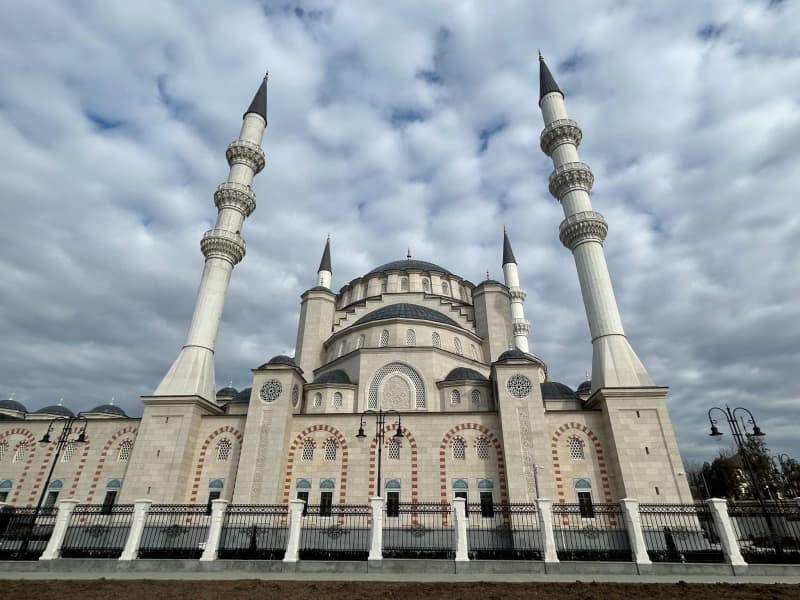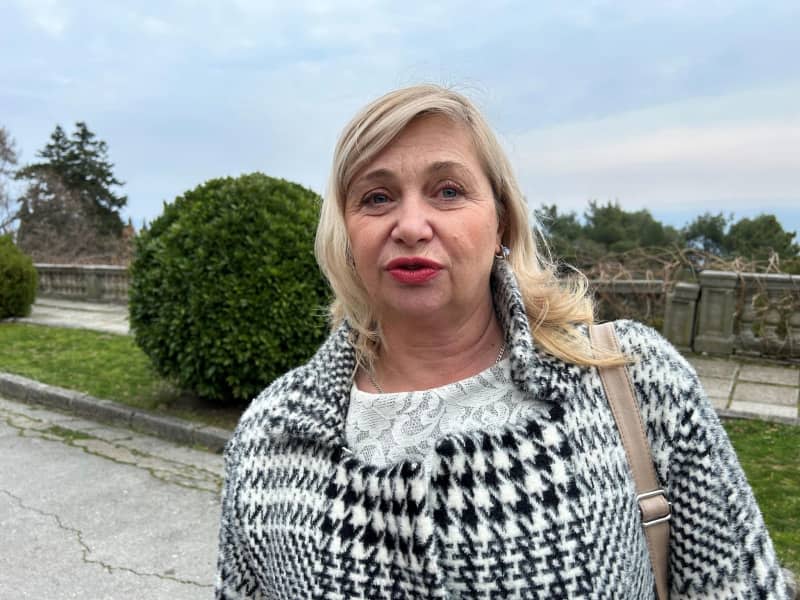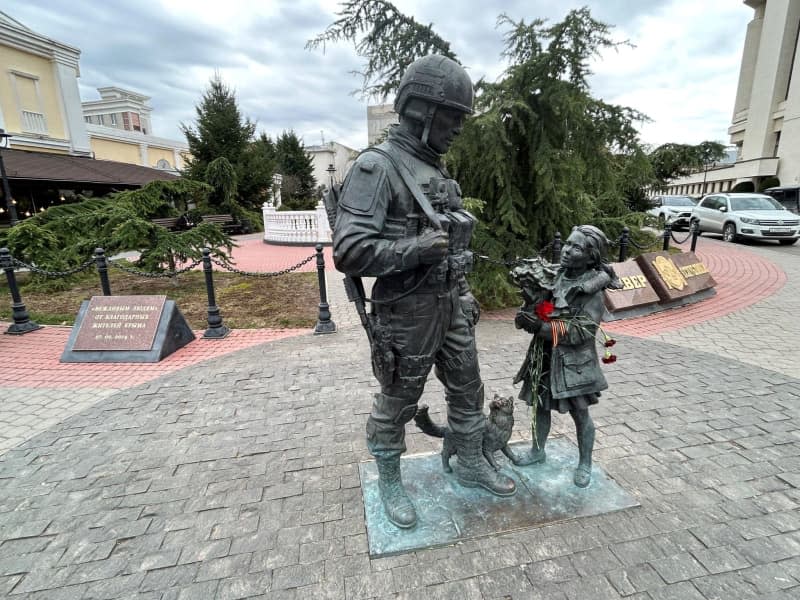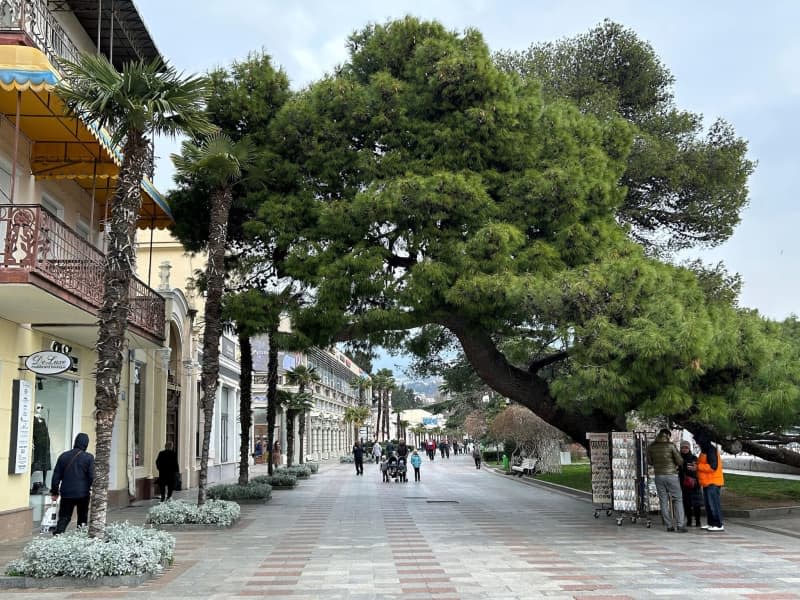A look at life on Crimea - 10 years after the Russian takeover
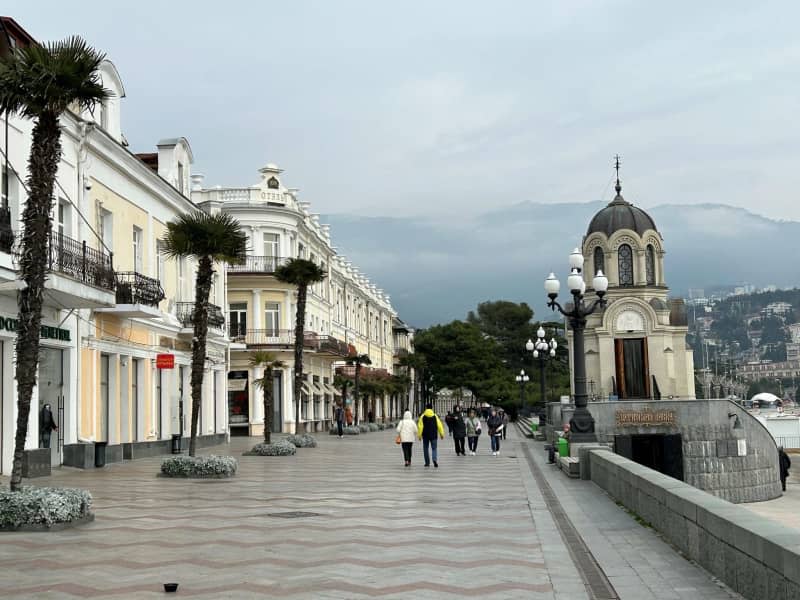
- Oops!Something went wrong.Please try again later.
The pavements on Sevastopol's waterfront promenade are torn up in places, as if after a drone strike. But passers-by emphasize that the damage was only caused by a severe winter storm - and not by Ukrainian attacks.
"Don't take pictures of the bay," an elderly woman grumbles. Air defence systems can be seen on old fortifications in the Crimean port city, which was often fought over in past centuries. "We are vigilant here against saboteurs and spies."
There are repeated attacks from Ukraine, which wants to reclaim the Black Sea peninsula that Russia illegally annexed from it 10 years ago. The 19-kilometre-long Crimean Bridge, also known as the Kerch Bridge, over which trains run - including to Sevastopol - is a particular focus of attention in eastern Crimea.
The bridge has once again become a major issue since air force officers from the German Armed Forces discussed how it could be destroyed with German Taurus cruise missiles in a conversation overheard by the Russians. Taurus deliveries from Germany are not on the cards in the foreseeable future. Nevertheless, Ukraine wants to cut Crimea's connection to Russia.
Sevastopol - home to the Black Sea Fleet for 240 years
A tense calm prevails in Sevastopol Bay, where several warships are anchored. Barriers float on the surface. They are designed to fend off attacks from surface drones in order to protect the Russian Black Sea Fleet, which has been based here for 240 years.
Although Moscow transferred Crimea to the Ukrainian Soviet Socialist Republic in 1954, it retained influence. Among others, this tradition of the Russian fleet in Sevastopol, which Kiev did not end even after the collapse of the Soviet Union, is one of the reasons why Moscow still lays claim to Crimea today.
Ten years ago, when Russia was in danger of losing its influence here for good after the fall of pro-Moscow president Viktor Yanukovych in Kiev, Russian President Vladimir Putin carried out the annexation in less than a month - in breach of international law. At least six people died.
On March 18, 2014, Putin sealed the incorporation of Crimea with its more than 2 million inhabitants into the Russian Federation. Hardly any country recognizes this.
On the anniversary, the tension in Sevastopol is palpable. The shock runs deep after Ukraine sank several Russian warships in its fight against the all-out Russian invasion of the neighbouring country launched by Putin on February 24, 2022.
"The frequent air alarms are getting to us, I already know several shelters from the inside," says Irina, who is in her mid-forties. She is standing on the magnificent Nakhimov Prospekt at the Sevastopol Hotel. From there you can also see the headquarters of the Black Sea Fleet, which was destroyed by a Ukrainian attack.
The roof has been smashed to pieces, the walls are torn down and chunks of rock lie on the lawn. The damage is massive - but nothing compared to the deadly destruction that Russia has been inflicting on large parts of Ukraine since its invasion began in 2022.
Putin posters in the pedestrian zone before the election
If you talk to passers-by, you will almost always find stoically militant residents, although even the authorities admit that there are "saboteurs" who support the Ukrainian fight to recapture the peninsula. People in Sevastopol speak openly about their grief for the fallen; many regret the ruptured ties to family members in Ukraine. Nevertheless, many are proud to be part of Russia, a nuclear power.
"Vladimir Putin saved us," says a pensioner at the eternal flame that commemorates the Soviet Union's victory in the Second World War. The senior citizen is pleased that, unlike in the past, pensions are higher - and stable.
Cranes are hoisting up a huge new complex close to the promenade. A large music theatre for opera, concerts and ballet as well as new flats are being built.
The spa town of Yalta
From Sevastopol, the route leads through wine-growing areas and along the coast with its karstic rock formations and green cypress groves to the distant subtropical health resort of Yalta. They can be seen from the country road, the pretty sanatoriums, hotels, magnificent villas and luxury flats with sea views. While many Ukrainians, including the family of President Volodymyr Zelensky, have lost their property, rich Russians are spreading out. Property prices in Crimea have exploded since the annexation.
Best known to history buffs as the site of the "Big Three" conference in February 1945, in which US President Franklin D Roosevelt, UK Prime Minister Winston Churchill and Russian leader Joseph Stalin met to discuss the future of Germany and Europe, Yalta is home to many spas and expensive real estate.
Tourists stroll along the waterfront promenade, where a huge Lenin monument stands next to palm trees. The restaurants are busy and there are shops selling natural cosmetics from Crimea every few metres. "We feel at home again since Russia took us in," says German and English teacher Natalja Fomina. Fomina is involved in the Crimea German community. Despite Crimea's isolation and Western sanctions, contact with friends in Germany is alive and well. "But of course we would like to see more humanitarian contacts, even in these times."
Longing for an end to the war
Many people in Yalta also spontaneously say in conversations on the street that they hope the war will end soon. However, their complaints centre on the strict Russian laws and bureaucracy, which are much tougher than under Ukrainian leadership. But some prefer not to speak openly.
An older man also complains that it is dangerous to express an opinion in public that differs from that of the Kremlin. He could lose his job or be imprisoned. But although, like many, he still has his Ukrainian passport and could still leave, he wants to stay and adapt.
Would he rather have the Ukrainian leadership back?
"Absolutely not," he blurts out. Chaos reigned back then. The man praises the new Tavrida motorway, for example, and the fact that journey times have become shorter.
Simferopol is Crimea's power centre
Crimea is controlled from Simferopol. The capital is about an hour and a half away from Yalta by car. The large railway station, where trains arrive from Moscow and other cities, is the most important transport hub. Since the modern airport has been closed due to the war, travellers can only use the train, bus or car.
Advertising on the blue city buses at the station commemorates the 10th anniversary of Russia's annexation of Crimea. A spruced-up park with brand new equipment on a playground stretches towards the city centre.
Indian students sit on the park benches. "We study medicine here," says a student from Mumbai, first in brittle Russian, then in English. More than 5,000 Indians are studying on the peninsula. The degree from Crimea counts in India, where there are hardly any opportunities for many young people to become doctors, he says.
Symbols of power and a new large mosque for Crimean Tatars
A young Russian couple happily says that much more is being done for public spaces today - including children's playgrounds in residential areas. "Look around, it's clean and beautiful. But everything has become very expensive," says the young man. His wife nods, 50,000 roubles ($540) is already a comparatively good monthly income. "People can't buy a flat with that," he says.
Life in the city is buzzing, young people dance to music in the pedestrian zone with its modern cafés, bars and restaurants. A monument at the beginning of the boulevard shows a soldier in heavy combat gear being presented with flowers by a girl - the sculpture is a reminder of how Putin sent "little green men" in uniform without national emblems to Crimea at the end of February 2014 in order to push through the annexation militarily.
Thousands of people resisted the occupation at the time, as Crimean Tatar Tamila Tasheva recalls in Kiev. "Ukrainians and Crimean Tatars expressed their protest against the occupiers, organized marches and protests and put their lives at risk," says the permanent representative of the Ukrainian president in the autonomous republic. There have been arrests and abductions.
Numerous Crimean Tatars are still missing today. Ten years of annexation is a decade of political persecution, and there are more than 200 political prisoners in Crimea today, says Tasheva. Around 70,000 people have left the peninsula since then.
The United Nations and the European Union also complain of massive human rights violations in Crimea. The Crimean Tatar parliament has been dissolved and the media have been blocked. But most of the Tatars have stayed. With a new large mosque, which is about to be opened despite all the obstacles caused by Western sanctions, Putin is hoping to bring peace to at least part of the Muslim minority.
A large façade painting on a building opposite the main Russian Orthodox church shows a portrait that resembles Putin. It is a reminder of who is in power here.
Crimea's Moscow-appointed Governor Sergei Aksyonov, who is officially known as the head of the republic and is wanted by Kiev as a traitor, is satisfied with what has been achieved at his seat of government in the city centre. Life on the peninsula is running normally. "The people's concerns are the same as everywhere else: wages, pensions, income and prices for food and medicine," says the 51-year-old.
The peninsula is now an up-and-coming region. There are sometimes problems with the delivery of goods and merchandise, for example when the Crimea Bridge is closed due to the threat of missiles. "But that's the only logistical problem. It can be solved," says Aksyonov.
The train journey on the "Grand Service Express" to Moscow takes a good 27.5 hours. It first takes us through the Crimea steppe, which is pale at this time of year. From the window, you can see dilapidated industrial plants, many abandoned houses and derelict stables in almost deserted settlements. Hardly any military. Dozens of Ukrainian train carriages in faded blue and yellow national colours rust away in a railway cemetery.
And then comes the Crimea Bridge, which leads from Kerch to the Russian heartland. In 2022 and 2023, the striking viaduct was severely damaged in attacks. Traffic is repeatedly halted during air raids. But this time everything remains calm. The train arrives in Moscow the next day - right on time.
